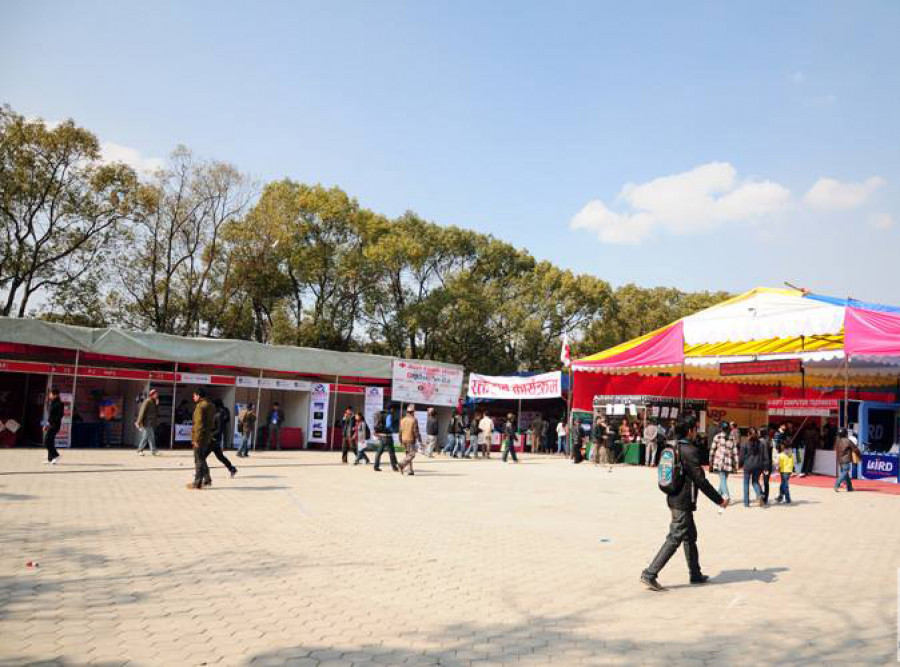National
Social Welfare Council refuses to allow Kathmandu Metropolitan City to build mega hall in Bhrikutimandap
The council has been using Bhrikutimandap as exhibition and convention centres and the property is its chief source of income.
Prithvi Man Shrestha
The Social Welfare Council has refused to vacate the land in Bhrikutimandap where the Kathmandu Metropolitan City is planning to develop a ‘mega hall’.
The council has been using the government-owned land by turning it into exhibition and convention centres, and they are the chief source of income for the council.
Last month, Kathmandu Mayor Bidya Sundar Shakya had announced the plane to build a mega hall on the property, a decision that was panned by many urban planners and heritage conservationists who accused the mayor of trying to further squeeze the few remaining open spaces in the city.
To execute the plan, the city office had approached the government and the council to secure the property in Bhrikutimandap.
“A recent board meeting of the council has rejected the city’s proposal on the grounds that it would deprive the council from its largest source of income,” said Durga Prasad Bhattarai, information officer at the council. “On Sunday, we sent a letter to the Ministry of Women, Children and Social Welfare to communicate the board’s decision.”
Earlier, the ministry had sought the opinion of the council after the city approached the ministry for its consent to provide the land.
According to the council, it has been generating around Rs120 million annually by renting out the space and exhibition halls for various events. The council’ annual expenditure for its employees alone stands at around Rs180 million.
“As the government has not proposed any alternative income source for us, we cannot allow the Kathmandu Metropolitan City to take over the land,” said Bhattarai.
Besides, he added the council itself is preparing its own master plan to further develop the area. The council plans to develop and maintain open space and greenery in Bhrikutimandap.
Meanwhile, the city officials have said that they would approach the government once again to secure the land for the mega hall project.
Saroj Basnet, vice-chairperson of the City Planning Commision under the city office, said the council’s decision to not vacate the property could complicate the city’s plan.
“The political leadership of Kathmandu Metropolitan City could take necessary steps to obtain the space for its mega hall project,” Basnet said.
The city authority plans to build the hall over 26.6 acres of land, with six meeting rooms, each accommodating 200 people, three conference halls for 450 people each, and an auditorium that can host up to 3,000 people at a time. It also plans to build a parking space for 1,000 cars, a green room, an exhibition hall, a food court and restaurants. The project is said to cost around Rs 12 billion.
Basnet said that the city will not take over all the land in Bhrikutimandap.
“About 60 percent of the space will remain fully open even after the project has been developed,” he said.
Bhrikutimandap is the only remaining open space in the heart of Kathmandu. The two other spaces, Tundikhel and Khulla Manch, have already been encroached upon.
The Khulla Manch area has been converted into a bus park after the previous bus park area was vacated for the purpose of remodelling it. The remodelled bus park is supposed to have a 29-storey view tower among many other amenities. The city authority had awarded the contract to Jaleswar Swachhanda Bkoi Builders. Several years have passed since the contract was awarded, but the contractor has still not completed the project.
Over the years, the Khulla Manch area, which was originally supposed to be a temporary bus park, has been encroached upon by shopkeepers and other business operators.
Now, Mayor Shakya’s office has come up with another plan to build structures in Bhrikutimandap, which is also one of the 800 locations identified by the Kathmandu Valley Development Authority as open spaces where people can assemble during disasters.
Urban planners and heritage conservationists said such structures should not be constructed on the only remaining open space in the city.
“This is the only breathing space that Kathmandu has. What the city is planning does not make any sense,” Suman Maher Shrestha, an urban planner, had told the Post in June. “This space has its own value for everyone, especially during the time of a crisis.”
Basnet said the mega hall project was introduced as there is no space for large scale exhibitions and conferences in the city. He went on to claim that there will be more open space in Bhrikutimandap after the mega hall has been built.
“Currently, only around 20 percent of the space in Bhrikutimandap is open,” he said.
Mayor Shakya has already earned plenty of infamy for his work and projects, including the reconstruction of Rani Pokhari and Kasthamandap. Heritage conservationists and urban planners say Shakya should be stopped from making yet another blunder in the name of city development.




 20.12°C Kathmandu
20.12°C Kathmandu















